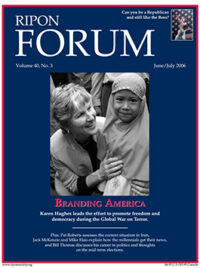
Last year’s media coverage of the Gulf Coast hurricanes helped re-define the domestic political agenda leading into this year’s mid-term elections.
But it wasn’t just storm coverage. Political damage control was in full effect, with elected officials from all sides of the political spectrum flocking to cable news channels to assuage public fears, tamp down public outrage and cover their backsides.
Most of these politicians probably didn’t even realize their message likely missed an entire generation of Americans. Why? Because there’s a new generation of Americans that is depending on television and other “traditional” media less and less and going one place more and more for news and information — the Internet.
They’re called the Millennial generation, or Millennials, for short. Aged 9-28, they are the largest generation in American history. There are one million more Millennials than Baby Boomers, and nearly twice as many Millennials as Gen Xers. While their influence is just beginning to be felt throughout our culture, Millennials are on their way to becoming the deciding factor in all things related to business, media and politics within a few short years.
Many of the world’s leading media and consumer companies are now beginning to recognize the influence this generation will yield. Guided by ongoing research conducted by the Millennial Strategy Program at Frank N. Magid Associates, private enterprise is planning for the future. The political world would do well to stand up and take note as well. To do so, most politicians will have to learn new skills, communicate in new ways on new platforms, and understand that they’re moving away from the 30-second television spot and toward searchable, shareable content most likely delivered and viewed over broadband Internet and watched whenever it’s convenient.
While their influence is just beginning to be felt throughout our culture, Millennials are on their way to becoming the deciding factor in all things related to business, media and politics within a few short years.
Millennials are growing up with great and highly personal expectations. Cable channels just for them, phones with their own ring tones, and t-shirts with their own personal messages are just a hint of how Millennials see the world as theirs to shape and mold. As many as eight in 10 Millennials have access to the Internet at home, work or school. And they use it. Most have access to the Web in several different locations. This everywhere/anytime access is leading to the increased adoption of the device that will champion the change from TV to the Internet — the laptop computer. A majority of adult Millennials owns a laptop, which, in today’s increasingly wireless environment, allows them to connect to the Internet virtually anywhere and anytime.
This has turbocharged the Millennial’s transition to Internet based information acquisition. In fact, for the youngest current voting block in the Millennial generation, 18 to 28 year-olds, the Internet is their first media choice, twice as popular as television. When Magid asked Millennials how frequently they use specific news sources, they placed Web portals like Yahoo! at the top of the list instead of NBC or ABC. Nearly half of adult Millennials access a Web portal for news everyday, and two-thirds use one at least once a week. To think that this is just a fad would be a gross miscalculation.The greatest number of Millennials says they expect to use the Internet for news even more in the future than they do now. Millennials’ use of television for news is expected to stay flat, at best.
Equally as important as reaching Millennials where they are is communicating in a way that resonates with them. A critical element in determining what’s relevant and important to Millennials is to understand the environment in which they’ve been raised.
The Millennial Generation is the most diverse generation ever, with four in 10 claiming an ethnicity other that white or Caucasian. Given the cultural and athletic opportunities provided to both males and females in this generation, Magid’s Millennial Strategy research suggests that the gender gap is less of a factor for Millennials than for older generations. In addition to their diversity, the Millennials are also a generation with a highly developed view of community and sense of service that makes last year’s boomer- driven Katrina fiasco even more potentially powerful in waking and making this generational giant.
Indeed, last year’s hurricane season, as influential as it was in helping shape the domestic political agenda, will look like a blip compared to the influence this generation will exert in shaping both American politics and American culture for decades to come. Effectively communicating with this generation is an imperative, in both Corporate America and American politics.
It means getting into the Millennial’s communications value chain by engaging them where they are always “on” — the Internet. But getting their attention is only half the battle. Once you’ve done that, your message has to resonate, and to resonate you have to be relevant to their unique way of thinking.
If you’re not relevant, you’re old news.
Michael Hais recently retired as Vice President of Entertainment Research at Frank N. Magid Associates. Jack MacKenzie created the Millennial Strategy Program at Frank N. Magid Associates and is a Senior Vice President at the firm.




